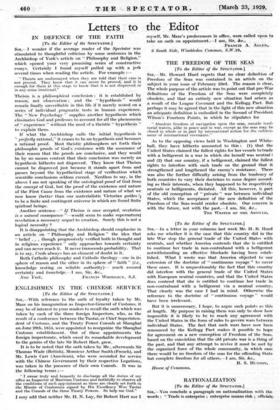THE FREEDOM OF THE SEAS [To the Editor of the
SPECTATOR.] Sur,—Mr. Howard Hurd regrets that no dear definition of - Freedom of the Seas was contained in an article on the subject in your issue of February 23rd. The reason is clear. The whole purpose of the article was to point out that pre-War definitions of the Freedom of the Seas were completely obsolete, and that an entirely new situation had arisen as a result of the League Covenant and the Kellogg Pact. But perhaps it may be agreed that in the light of this new situation. an adequate definition is embodied in the Second of President Wilson's Fourteen Points, in which he stipulates for " Absolute freedom of navigation upon the seas, outside terri- torial waters, alike in peace "andin war, except as the seas may be closed in whole or in part, by international action for the enforce- ment of international covenants."
As to the opposing views held in Washington and White- hall, they have hitherto amounted to this : (1) that the United States claimed the fullest rights for her vessels to trade with a belligerent in a war in which she herself was neutral ; and (2) that our country, if a belligerent, claimed the fullest rights to interfere with such trade on the ground that it strengthened and lengthened the enemy's resistance. There was also the further difficulty arising from the tendency of both countries to vary their doctrines to some degree accord- ing as their interests, when they happened to be respectively neutrals or belligerents, dictated. All this, however, is part of the old conception of " private " war between individual States, which the acceptance of the new definition of the Freedom of the Seas would render obsolete. Our concern is with the future, not with the past.—I am, Sir, &c., THE WRITER OF THE ARTICLE. [To the Editor of the SPECTATOR.]
















































 Previous page
Previous page